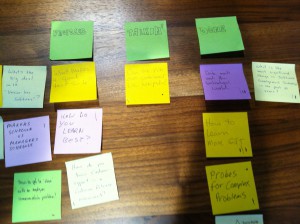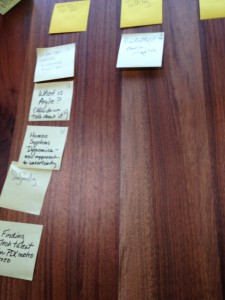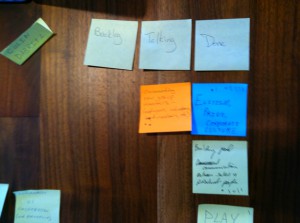Once again, thank you to Colin for taking notes.
Topics that made the cut:
- Data nerds and the (un)natural world
- Tracking data
- Examples: Apartment prices in building, MAX Car #s, License plate photos from all 50 states
- These are unnatural world
- Like stargazing and philosophy
- “boardgamegeek.com” games played database, bridge, chess, Magic the gathering, scrabble tend to be “solo” games
- Given a data set how do you find a signal in there?
- “Kids game”, I have a device that easy to capture, fun, wasn’t seeking data
- Idle curiosity, liking to measure and capture
- Similar to days before, shell collections etc, collecting comes first
- Technology captures
- Quantity of data
- Journaling events in calendar, e.g. sleep in google calendar, morning routine etc, corrected as it happens and tweaks (why do we have empty spaces on calendars?)
- becoming useful, e.g. density of out of state drivers
- Act of collecting changing your view (vs only collecting for a reason or goal)
- Collecting is noticing, becoming aware
- Collecting and Mining, sometimes can’t tell you why the other is important, but doing the other gives you a new perspective
- How to learn more Git
- Git is powerful
- Easy to screw up a checkin
- Live in fear of so many comitters
- We should have git competency, aptitudes that everyone should have, and an advanced set of skills that someone in the group should have
- One in the “group” vs one in the “building”?
- Could have Git “moves” algorithm to do things safely, recipe of safe ‘moves’
- Safety vs correctness
- Problem is git safe stuff is right by unsafe stuff
- Commits every 5 minutes
- Source control complexity, much comes from the idea of “storing unfinished work” (git has stash, branch, other tools)
- Software development is chaos, discovery, exploration – Is that inherently problematic? Not modeled properly in source control?
- Short branch and frequent integration, a long branch is a bad branch
- Could pick a core set of git practices that favor good behaviors (How to communicate this?)
- Probes for Complex Problems
- How do we deal with problems? not sure of scope, don’t know the right way through etc.
- How do you wrestle with them?
- Being ok with failing
- Mystery problems, not sure why it’s broken.. collect more data? Get a better view of what is going on?
- Agile – Try a solution, iterate, ship frequently
- “what do I NOT know how to do?” Tackle the unknowns first
- Top to bottom solutions, a “spike” all the way through quickly
- breaking problems down
- Go for a model problem,what embodies the hard part of the problem, but is simple in other respects? (solve a smaller problem first)
- Learn the parts, relationships
- “I don’t think there are any problems that can’t be broken down”
- How is a probe different than a solution? A probe is a test for a solution.
- Your probe is based on assumptions that you make up front, you form a hypothesis and test it
- Why are things the way they are? What would make that be wrong? Can we test that?
- Gaming – solving real problems (e.g. the protein shape puzzle)
- “Your problem is you don’t understand your problem” get used to it, play with it
- “Mathematicians use “play” to mean very serious work” “and software engineers use “work” to mean very serious play”
- Divide and conquer separates you from all the pieces, you get stuck in a reductionist mode)
- The Gervais principle
- (e.g. Ricky gervais)
- Pyramid: Losers on the bottom, clueless in the middle, sociopaths on the top
- Blog post on this problem
- This describes a dysfunctional organization well
- People choosing to do what is dysfunctional because it’s comfortable
- Feedback from middle based on politics and yes men
- Non-delivering political environment
- The labels are very judgmental (and humor based), but the problem is real
- Clueless band are highly loyal much more than the other layers are
- Tribal leadership, 5 stages of evolution, cultural evolution
- L1: Like in prison world sucks, L2: My life sucks, L3: I’m great but everyone else sucks, L4: Were great, L5: The world is great
- Has to do with the way leadership make tribes, or tribes of tribes
- Instil a sense of empowerment
- Pyramid with positive layers, building it up without falling into above is a great achievement
- They may have a lot of problems going on, but they are forgiven for achieving great things
- What is the most significant change in software develop in the past 10 years?
- Stack overflow
- Accessibility
- Leveling sharing we’ve talked about forever is being delivered on (with the rise of the internet)
- Huge repository of knowledge
- You can almost always find someone else who has had a particular problem before, and what they tried or solved
- Not just sharing and size of knowledge base but searching and filtering
- We still really haven’t adjusted our model to realize
- We don’t assess ability for new hires to rapidly acquire knowledge (habits in hiring that are hard to break)
- Let developers decide who to hire, #1 question – Who do you follow online (e.g. where do you get info)
- Another thing that we see, now you work in 3-6 languages at a time, because you can. (this wasn’t true before, couldn’t keep that much in your head)
- Right sized lego blocks
- “has this been done before, and can I find it?”
- If I learned more I can contribute back and say how I found it, blog post on my outage, error, etc. Culture of contributing knowledge.
- Google never confronts you with “that’s the wrong question”, searching is big skill, what terms? What question? How far back?
- How far back do you have to go to figure out you’re doing the wrong thing?
- Can we run our government like wikipedia?
- Wikipedia runs interestingly today, some problems
- How does wikipedia run?
- Every kind of misbehavior is understood, never destroying information, transparency and history
- goal to inform could be solid
- People can find the media that agree with their world view, (confirmation bias)
- How strong is special interest influence, power seeking?
- You don’t have a total budget for pages on wikipedia, unlike the national budget
- Decisions made impact people directly, unlike wikipedia info, may no agree with you
- Heart of the question: Can we have a governance system that allows transparency? Feels like not yet.
- How to get to ‘Done’ with an employee communication problem?
- Recently had a long time employee leave due to reorganization of administration and shifting roles
- Changed role of a person who had been around a long time, cause them to be unhappy
- Mediation didn’t work
- Most people are thinking about what they are going to say in response
- Need to JUST LISTEN – True listening is a hard skill
- There are things you can’t say, things that are inappropriate, business doesn’t allow the directness
- Bringing up specific grievances instead is problematic, because they can be addressed.
- Need to have other people who can take in the vague input and divine the direct problem
- One of the problems – coming with focusing on “how do we get this done?” “how do we solve the problem?”
- The thing needs to be allowed to NOT be done in order to get to done
- When people do a job change this affects them negatively, you get a negative curve for a while, you need to help them settle out. You have to be checking in with them, face to face conversations
- Working with introverts, have to elicit feedback (and respect it)
- Change cycle is similar to grief cycle (“my job has just died”)




